Ridley Scott’s 2010 film Robin Hood has been touted as being “Robin Hood as you’ve never seen him.” Well, it depends on the “you” and the “seen.”
[What follows contains Spoilers, so if you haven’t seen it, you’ve been warned.]
Certainly, many of the tellings of Robin Hood are about Robin’s life as the leading outlaw of Sherwood Forest. Some versions have touched on what went before, how he came to be an outlaw, or what happened late in life.
The British television series in the 1980s showed how first a yeoman
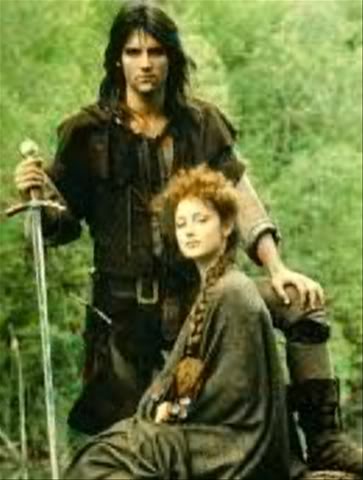 and then an Earl’s son
and then an Earl’s son
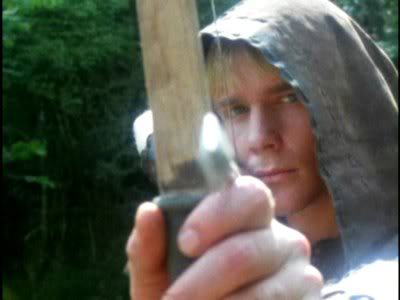 became Robin Hood. The Kevin Costner film Robin Hood: Prince of Thieves
became Robin Hood. The Kevin Costner film Robin Hood: Prince of Thieves
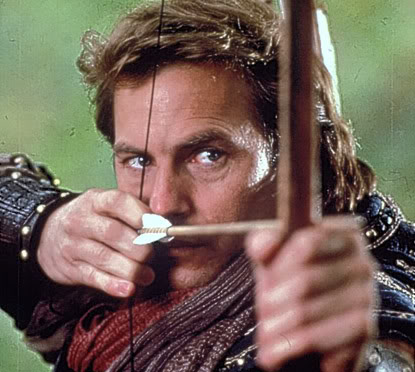 shows Robin as a nobleman crusader who returns home to fight injustice. 1976’s Robin and Marion
shows Robin as a nobleman crusader who returns home to fight injustice. 1976’s Robin and Marion
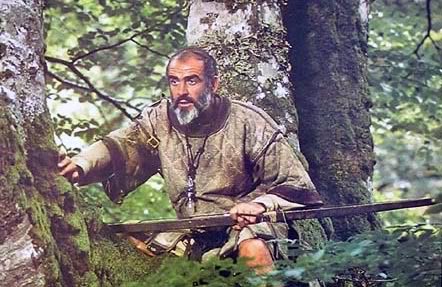 also showed Robin as a crusader, who followed Richard the LionHeart off to war (after many forest adventures) and then returned home a much older man after the King’s death.
also showed Robin as a crusader, who followed Richard the LionHeart off to war (after many forest adventures) and then returned home a much older man after the King’s death.
The literature and legends of Robin Hood cover many variations of how Robin became Robin Hood. So, the claim that Scott’s Robin would be nothing like what you knew before is actually stretching the point, even if just limited to film appearances (and yes, I skipped mentioning the Flynn version). Scott’s film doesn’t really stray very far from the core of the myth of Robin Hood as it has become.
First off, Robin Hood is one of the key examples of what an Outlaw Hero is. Of the community, but not in it. And the hero addresses some flaw in society. So far, so good. We’re on track.
One thing that Scott’s Robin Hood does do is make our hero, Robin Longstride, a Transformer. By being present in a scene, this Robin changes things. More usually, one would expect Robin Hood to be a Trickster, the underdog who punctures illusions and outwits “bigger” opponents. But Scott doesn’t go that route.
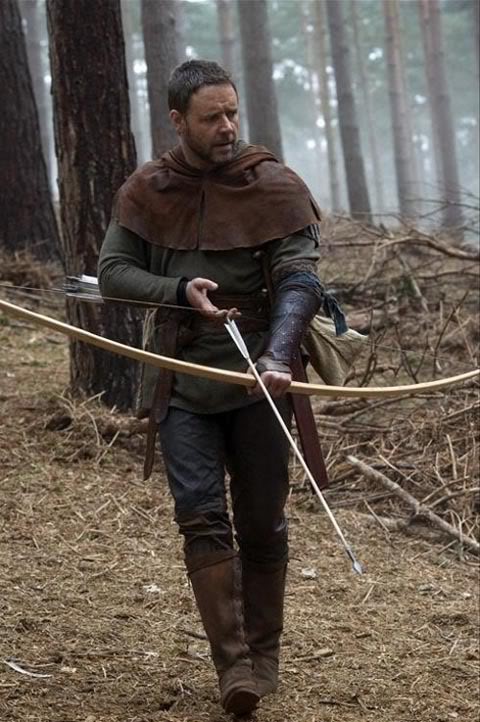 Early on in the film, King Richard explores his camp with his aide Robert Loxley, looking for an honest man. They encounter a brawling Robin, who has been entertaining fellow soldiers with the shell game. Then he is asked by the King to be honest and tell whether he thinks the King’s actions have pleased God. Remember, as a Transformer, Robin changes things. Even though Loxley tries to surreptitiously warn him against honesty, Robin says no, and cites a massacre Richard ordered in the Holy Land.
Early on in the film, King Richard explores his camp with his aide Robert Loxley, looking for an honest man. They encounter a brawling Robin, who has been entertaining fellow soldiers with the shell game. Then he is asked by the King to be honest and tell whether he thinks the King’s actions have pleased God. Remember, as a Transformer, Robin changes things. Even though Loxley tries to surreptitiously warn him against honesty, Robin says no, and cites a massacre Richard ordered in the Holy Land.
His honesty gets him put into stocks, where he is sitting when the King is killed. Robin and his co-horts use the situation to cover their escape from Richard’s army.
As they head back to England, they encounter the ambush of the English messengers taking the news of Richard’s death – and Richard’s crown – back to England. And Robert Loxley is the leader. With his dying breaths, Loxley charges Robin with returning his sword to his father. Robin decides to honor the request and does so by taking on Loxley’s identity.
Taking on a new identity certainly does transform things for a character. But in doing this, Robin not only changes his social identity, he takes up the “burden” and responsibilities belonging to Loxley. And in taking on that role he changes himself. Likewise, in taking on Loxley’s identity, he has to take on Loxley’s wife. This is yet another change for Robin (and for Marion).
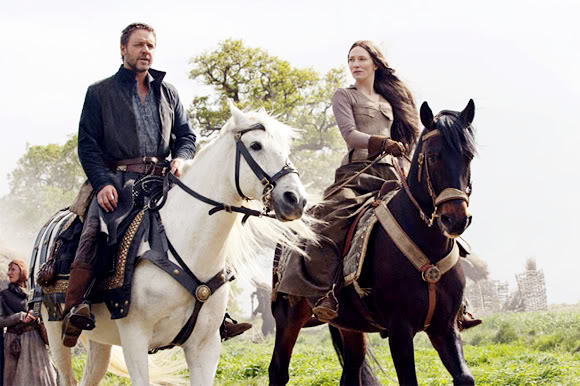 Once he takes on this identity, his presence changes the way people react around him. Their response to his perceived status strengthens his inherent resolution and leadership abilities. That too changes him.
Once he takes on this identity, his presence changes the way people react around him. Their response to his perceived status strengthens his inherent resolution and leadership abilities. That too changes him.
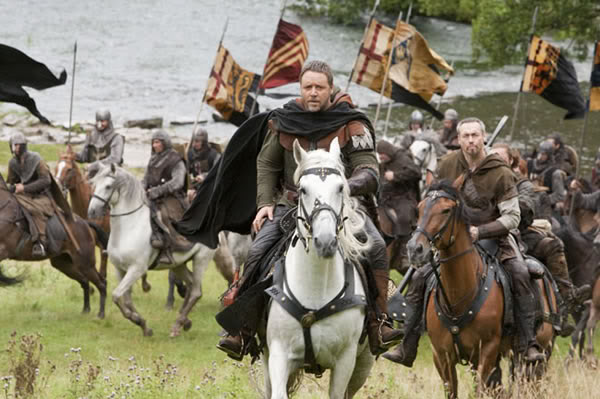 Onward the story goes, with the circumstances changing Robin and him changing the circumstances. Right up to the point where King John rejects the changes in the power structure that had been prepared by Robin’s father and the Barons years before. John declares Robin to be outlawed and so the “Legend Proper” begins.
Onward the story goes, with the circumstances changing Robin and him changing the circumstances. Right up to the point where King John rejects the changes in the power structure that had been prepared by Robin’s father and the Barons years before. John declares Robin to be outlawed and so the “Legend Proper” begins.
There’s not much here that is alien to the nature of the Robin Hood legend. Scott’s changes are, in effect, a distinction without much difference. The one key “difference” in Ridley Scott’s version is that instead of a Trickster, he has given us the story of how a Transformer becomes an Outlaw Hero.
Pictures from Robin of Sherwood property of Goldcrest Films Int., Harlech Television, ITV. / Picture from Robin Hood: Prince of Thieves property of Warner Bros. Pictures / Picture from Robin and Marion property of Columbia Pictures / Pictures from Robin Hood property of Universal Pictures.

I think the maiming away of the Trickster element from Robin is a major loss, however.
One of the major joys in almost any modern version of Robin Hood has been the wit and insightfulness of the character. Flynn’s interpetation is witty as well as insightful, of course, as is Sir Sean’s. While neither of the Robins of Robin of Sherwood have the sparkling eloquence, both of them have the insight and the power to inspire.
Scott’s Robin Hood does hie back to the earliest ballads about the character, in which he is neither heroic nor charitable but instead a cathartic shadow figure who amused impoverished listeners with a few gratutious murders of wealthy victims for the sake of money he stole from the rich and then kept for himself.
The character in Scott’s film does slowly transition into an outlaw hero, but there is something distastefully thuggish about him, almost anti-intellectual, as though Scott were trying to apologize for the wit and “efeminate” kindness of earlier film interpretations of Robin.
The thing I found disappointing in Scott’s Robin was that he was rather selfish. That went against the flow of how the mythos has been handled for a long time. It’s one thing for the character to be self-centered, it’s something else for him to be selfish. I think if Scott’s Robin had been portrayed by a lesser actor, he would have been entirely unpalatable. In the early part of the film we are not given any hints that Robin’s father instilled even a drop of idealism in him, so the turn at the end of him taking up his father’s long buried cause comes across as imposed on the story.
It’s possible for a character to be self-centered, charming, and yet generous. It’s part of the appeal of Peter Pan, for instance.
I think you’re right about the almost anti-intellectual bent of Scott’s Robin. It’s almost as if there’s an underlying distrust of active idealism, and yet a consciousness of the continued popularity of such qualities.
(You’re giving me lots to think about for another project of mine! Thanks!)
I look forward to reading this project if it is a blog project!
Alas, it is not. It’s a futuristic television project I’m shaping up. I wanted to do a “Robin Hood” type situation, and this discussion is giving me a better bead on some of the issues I want to weave in. I’m still in the “world building” stage of the project. But thanks for your interest!